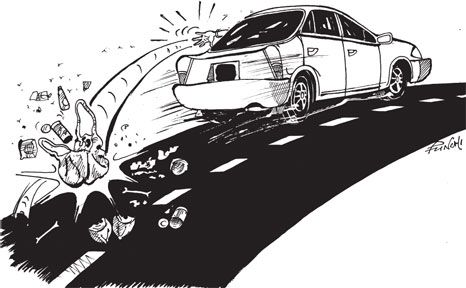Whither cleanliness?
by N.K. Alahakoon
If cleanliness is next to godliness, what does the state of our
country tell others about us? Everywhere you look garbage, dirt and
filth is a part of our life.
 It may seem like trivial problems in the light of graver, more
serious issues in our country, but it definitely deserves attention. It may seem like trivial problems in the light of graver, more
serious issues in our country, but it definitely deserves attention.
It's common to see people fling rubbish out of their vehicles as they
drive by. Their excuse? 'Everyone does it.'
What they fail to realise is that if 'everyone' changed that mindset
and 'no one' did it, the problem would be largely solved. Stuck at
traffic lights one day, I watched as a person in the classy ministerial
vehicle in front of me rolled down his window and began to throw out
rambutan skins and spit out the seeds.
This irreverence towards environmental cleanliness is a common
attitude.
After a festival like Vesak or New Year, wrappers, paper, plastic and
other rubbish cover the ground as far as the eye can see. Just as it is
common to see people crossing the road with the yellow lines twenty feet
away, it is common to see people throw their litter about with a garbage
can sitting empty nearby.
Personal hygiene is a virtually novel topic for most. Travelling by
public transport is in itself a challenge. It would be nice to use a
deodorant or give oneself a pedicure at least once a week, especially
when it affects others. A packed bus or train is a cylinder of
unpleasant body odour one is compelled to inhale.
Apart from these, there are problems like that off 'urination'. If
one sees a man standing shiftily by the side of the road, it's a good
guess he's relieving himself.
Some months back after watching a show at the BMICH, on returning to
the car park, I saw a line of men and boys heartily relieving themselves
against the wall into the drain.
In their defence, it could be said that there aren't enough public
toilets and yet can we really excuse such behaviour? Isn't this
something we have to work on?
Unlike in previous times, there are garbage collectors even in the
smaller towns now. A tractor with garbage and usually one or two workers
sitting atop the heap of dirt go about collecting the plastic bags that
hang dripping off gate-tops or placed by the roadside sometimes spilling
half their contents on the road.
The tractor itself is slow moving, holds up traffic and slowly
renders dizzy the unfortunate drivers behind. When one compares this
with the sophisticated methods used in developed countries, the
difference is immense. We have a long way to go before we can reach that
level. Probably the most important thing is to raise awareness. A lot of
people simply are not aware of the negative effects of polluting the
environment.
From a young age children need to be taught to respect the
environment and to maintain cleanliness in every way. Adults have to
break old habits and learn to keep the environment clean.
The danger of pollution has to be continually stamped on our
consciousness. The matter struck me in all seriousness on a trip I took
two years ago to Jaffna. The group stopped for lunch at a roadside on
the way to Paranthan.
I was impressed at the pristine cleanliness of the place where few
people had travelled since the war had ended. There was no garbage
anywhere: not a single toffee wrapper or plastic bag. It was beautiful
and pure.
But when the group left the place, lunch sheets were strewn along the
grass in the wind in all directions. "They'll drift away for the wind,"
said the man in charge of the group, as if plastic could just vanish
into thin air.
Many people share that view, if they even think about it at all.
We could learn a thing or two from Singapore, one of the cleanest if
not the cleanest country in the world. The secret: fines (up to $5000 in
some cases), public education (campaigns) and investment (public trash
bins and cleaning contractors).
In some cases, repeat offenders are made to watch a video that
explains the harmful effects of pollution in an attempt to educate them.
Many Singaporeans agree that it is the strict enforcement of law and
fines that changed the country into what it is today.Progress is a
concept that is at a high point currently in our country.
Progress and development should also mean the state in society which
reaches every aspect, including the national mindset. Maintaining
cleanliness shows an ability to follow rules as well as an understanding
of the environment.
It also indicates consideration towards others.Let us hope that we
too can progress into a state of cleanliness akin to that found in
developed countries. |

